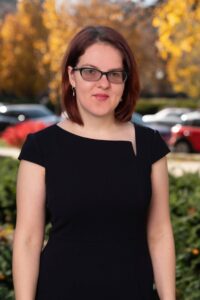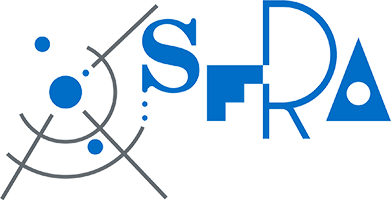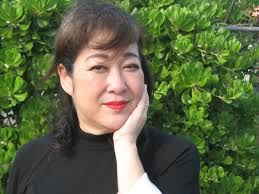by Carma | Dec 11, 2021 | Awards, News

Anastasia Klimchynskaya photographed at the Stevanovich Institute on the Formation of Knowledge on November 6, 2020. (Photo by Jason Smith)
The SFRA is delighted to announce that Dr. Anastasia Klimchynskaya is the winner of the Support a New Scholar Award. Congratulations, Dr. Klimchynskaya!
Dr. Klimchynskaya is a Postdoctoral Fellow at the Stevanovich Institute on the Formation of Knowledge at the University of Chicago. Her work prioritizes an interdisciplinary approach that combines literary study, the cultural history of science, and material culture, and is interested in interrogating the relations between technoscientific reality, literary narratives, and the cultural imagination. Her current project focuses on the emergence of science fiction in the nineteenth century, taking a capacious approach to French, British, and American science fiction texts as products not just of discrete scientific practices or ideas, but of the paradigms and conceptual frameworks that these practices and discoveries existed within and produced.
She is also passionate about sharing her love of science fiction and bringing an understanding of its power, possibilities, and relevance to students in the classroom and the broader public outside the academy. Since 2015, she has been on the programming staff of Philcon, the Philadelphia Science Fiction Conference, and has taught courses on science fiction at the University of Pennsylvania, the University of Chicago, and the Rosenbach Library and Museum – including “Living in a Science Fiction World,” a course that examined contemporary social, technological, political, and ethical issues through the lens of science fiction.
by Carma | Nov 9, 2020 | Awards
We are pleased to post a call for applications for the SFRA Support a New Scholar Program (SNS), for 2021-22*.
This New Scholars Program supports advanced students and scholars of outstanding promise to assist them in taking part as active members of the science fiction community.
This excellence-based grant is aimed to help fund one graduate student and one non-tenure-track scholar for a period of two years, covering membership costs.
Please find below eligibility criteria and application forms for both tracks.
DEADLINE FOR SUBMISSION: November 15, 2020
To submit applications or if you have any further questions please contact the SFRA Vice President, Sonja Fritzsche at: fritzsc9@msu.edu
- Eligible candidates will have a proven interest in SF.
- They must be students currently registered for a graduate degree program (Masters / Doctoral) in a recognized institution of higher education.
- Candidates may apply more than once for the program but can only be awarded one time (no matter which track).
- Awarded scholars are encouraged to attend the SFRA conference during the years they participate in the program.
Please submit the following material together with your completed form to the SFRA Vice President, Sonja Fritzsche, fritzsc9@msu.edu, no later than November 15, 2020 [Please note, applications with missing material will not be considered]:
by Carma | Jan 10, 2020 | Awards
 Congratulations to the winner of the 2020-2021 Support a New Scholar Award,
Congratulations to the winner of the 2020-2021 Support a New Scholar Award,
Ida Yoshinaga!
Brief Bio
Earning her Ph.D. from the University of Hawaiʻi-Mānoa Department of English Creative Writing Program, Ida Yoshinaga combines creative writing pedagogy, genre theory, and formal analyses of story development and of screenplay drafting during the screen story production process. In her dissertation, she analyzed the connections between fantastic-genre audiovisual modes, the employment and promotion of minority screenwriters within Hollywood’s labor-management relations, and the cultural politics of screen representation as a result of the social stratification of teleplay writers and producers during this Peak TV era. A Disney scholar, she also researches the complex dynamics between labor and leisure within the political economy of transmedial (i.e., “franchise” or “IP”) fantastic storytelling, deploying cross-platform narratological analyses to evaluate gender, class, racial, and colonial memes across narrative and non-narrative fantasy media.
Research Statement
I contrast Disney’s mass-produced, Big-Data-guided articulations of the fantastic with female consumers’ practice of a fantasy imaginary within and outside of Disney’s storyworld platforms, including film, TV, fashion, food, and theme parks. Focusing on digital-age technologies of creative-labor extraction by Disney and their relationship to diverse female consumer subjectivities produced through its worldwide fantasy lifestyle empire, I analyze data from passive observation conducted at Disney Parks and Universal Studios Parks (and resorts) alongside those from fieldwork at alternative fantasy franchise and non-franchise leisure sites in the community, framing those findings against the scripted production of fantasy narrative by Disney writers.
by Carma | Jan 18, 2019 | Awards
 Congratulations, Beata Gubacsi, on winning the Support a New Scholar Award!
Congratulations, Beata Gubacsi, on winning the Support a New Scholar Award!
Beata Gubacsi is a Ph.D. candidate at the University of Liverpool. Her research interests are genre, trauma, climate and animal studies, technology in medicine, and health care with a focus on gaming and mental health. While working on her thesis, “Literature of Monstrosity: Posthumanism and the New Weird”, she has also been involved in Bluecoat Liverpool’s science fiction projects as part of her LiNK placement, and co-hosting and facilitating workshops at the Being Human Festival, Tate Exchange, and Nottingham New Art Exchange. She is the author of the column, “Medical Humanities 2.0”, for The Polyphony, the blog of the Institute for Medical Humanities at Durham University while also running the Current Research in Speculative Fiction Conference. Most recently, she has joined the team of the Fantastika Journal as assistant reviews editor.
Her research project, “Literature of Monstrosity: Posthumanism and the New Weird”, seeks to establish conceptual and aesthetic connections between Critical Posthumanism and the New Weird through their interactions with postmodernism. One of the most significant of these overlaps is the way both Critical Posthumanism and the New Weird respond to “global weirding”, the current ideological and environmental crisis, by redefining the notion of the Other via anti-humanist postmodernist criticism of normative ideologies. The thesis argues that said crisis is not only traumatic in itself but also a return of previous primordial trauma, the abjection of the ultimate Other, the animal. Regarding both Critical Posthumanism and the New Weird as trauma narrative, embodied in the figure of the posthuman/monster, yields the question of whether New Weird can be understood as posthumanist literature?
by Carma | Jan 29, 2018 | Awards
 The SFRA is delighted to announce that Dr. Emily Cox is the winner of the Support a New Scholar Award.
The SFRA is delighted to announce that Dr. Emily Cox is the winner of the Support a New Scholar Award.
Congratulations, Dr. Cox!
Having completed her doctorate at Brunel University in science fiction literature and continental philosophy, Dr. Emily Cox researches SF, gender theory, and the work of Giorgio Agamben and Gilles Deleuze. She is particularly interested in applying Agamben’s concepts of in-operativity and bare life to gender theory in SF media and popular culture. Dr. Cox also works as Public Relations editor for the journal Femspec, and her article ‘Denuding the Gynoid: The Woman Machine as Bare Life in Alex Garland’s Ex Machina’ is soon to be published in the journal Foundation.
by Carma | Oct 11, 2017 | Awards
SFRA Grad Student Members: Remember to submit your conference presentation from last summer’s SFRA 2017 conference in Riverside for consideration for the Graduate Student Paper Award. It’s a great opportunity to have your work honored by your sf peers and to build lines for your CV.
In order to be eligible, all you have to do is send in the paper that you presented as you presented it (no revised or extended versions – other than light editing to correct typos). Please attach all presentations (either in Microsoft Word or PDF format) to an email with the subject line, “SFRA Grad Student Award Submission” and send them to (hugh.oconnell@umb.edu). The deadline for submission is Wednesday, November 15th.
If you have any questions, please feel free to contact the chair of the committee, Hugh O’Connell, directly at the above email.
The committee looks forward to reading your work.


 Congratulations to the winner of the 2020-2021 Support a New Scholar Award,
Congratulations to the winner of the 2020-2021 Support a New Scholar Award, Congratulations, Beata Gubacsi, on winning the Support a New Scholar Award!
Congratulations, Beata Gubacsi, on winning the Support a New Scholar Award! The SFRA is delighted to announce that Dr. Emily Cox is the winner of the Support a New Scholar Award.
The SFRA is delighted to announce that Dr. Emily Cox is the winner of the Support a New Scholar Award.